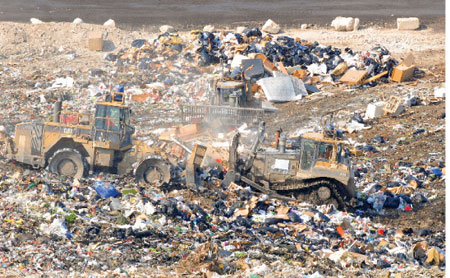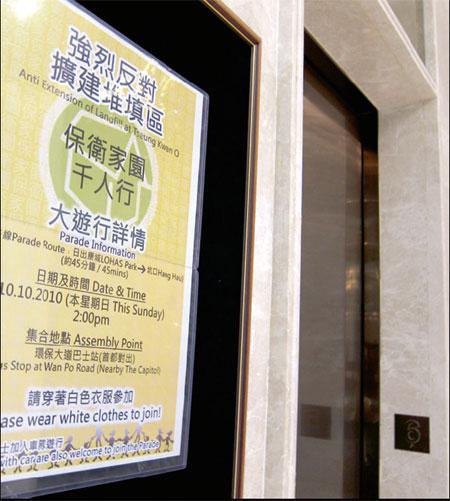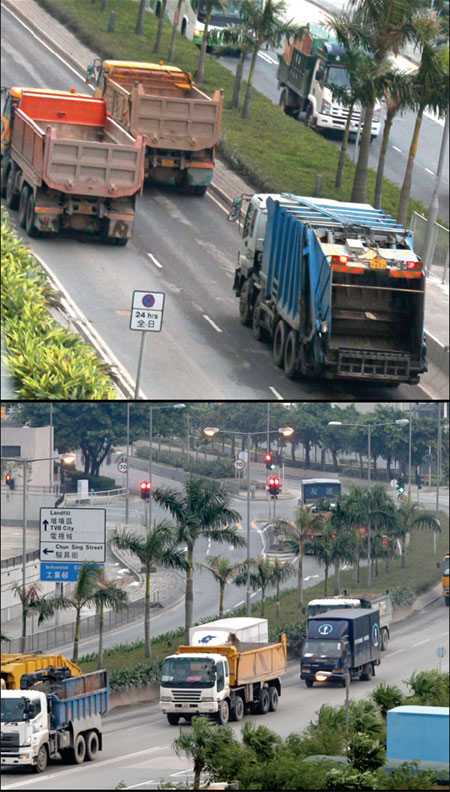It sure doesn't smell like roses
Updated: 2010-10-22 08:26
By Guo Jiaxue(HK Edition)
|
|||||||
|
The expansion of the Tseung Kwan O landfill site is meeting fierce opposition from nearby residents. Edmond Tang / China Daily |
When residents of Lohas Park moved into their newly built homes none of them ever believed the government would forge ahead with plans for a massive expansion of a nearby landfill. Faced with another five to six years of evil smelling garbage, they fought back. Guo Jiaxue reports.
A six-hour debate in the Legislative Council (LegCo) on October 13 ended with the revocation of a government order to encroach five hectares from Clear Water Bay Country Park, to expand the Tseung Kwan O landfill site. Residents of Lohas Park, who live only 800 meters away from the landfill site, consider the LegCo decision a victory, and one that they perhaps can savor more than others. They are determined to continue to work in opposition until the government's entire landfill expansion program is cancelled.
The fierce opposition mounted by the neighbors is a matter of protecting their homes. They share a sense that they have been treated unjustly, with collective anger accumulating for a long time.
Sixty-year-old Daisy Tam moved into the neighborhood on August 24. Tam chose the newly completed flat located in quiet suburban Lohas Park because she thought it would be a good place to take care of her 89-year-old mother.
Sadly, the joy of settling into the new home didn't last long. Early in the morning of the third day, an odious smell invaded her home and the entire neighborhood and hung in the air for hours.
Tam recalled the smell was "the extreme stink of rotting garbage". "I remember it very clearly. The smell, which didn't go away, stayed for I-can't-remember-how-many hours," she said. "My mother said she'd never experienced such a bad smell before in her entire life!"
Standing on her balcony, a clear picture emerges for Tam as to how garbage is transported to the landfill and disposed: the garbage trucks run back and forth on Wan Po Road; down the road, about 1 km away is the Tseung Kwan O landfill site, covered in deep layers of green plastic. With the help of a telescope, Tam can even clearly see how the trucks drive into the site one after another and slowly dump all the garbage they carry. "There are more trucks every morning, queuing in a long line on the road," she added.
Although mentally prepared before moving in, Tam still was shocked by the impact of the landfill site on her normal life. She tried always keeping her windows closed, turning on her air-conditioning. But it didn't help much. "What the air conditioner does is just bring in the air from the outside. It still smells terrible."
Nonetheless, Tam has no time to cope with the sticky bad odor problem caused by the busy waste treatment activities. She has no choice but to put it aside. Another much bigger and more urgent problem looms: to stop the government from enlarging the site.
"If so, I really don't know what to do, move again? Or sell it? There is no way people can live in such a dirty environment," Tam said helplessly.
The government is trying very hard to expand the landfill by 50 hectares, which are about equal to the area of six Victoria Parks, to extend its lifespan by another six years. The 50 hectares of expansion covers 30 hectares to be piggy-backed over the existing landfill, 15 hectares from the nearby Tseung Kwan O Area 137, and 5 hectares from Clear Water Bay Country Park. That means that the neighbors will have to endure the smell until about 2019, rather than 2013 when the present site is expected to reach capacity.
The news of the intended landfill expansion caught Tam and her neighbors completely off guard. After the owners of Lohas Park spent millions on their properties and moved in last summer, they held to the expectation that the odor problem would bother them for three years, or four years at most.
Although the expansion was first proposed by the government in 2005, and the Environmental Permit for the Landfill Extension was granted in August 2008, no one really expected it to happen given that a cluster of residential buildings were under construction nearby. It was not until May that the government tabled in the Legislative Council its plan to appropriate five hectares of the country park.
"They told me the landfill will be closed in 2013. And the place will become the second Tai Koo Shing in Hong Kong, and even bigger, 60 thousand people will live here," said retiree Hong Heng-cheong. "I queued in long lines to buy the flat at the pre-sale!" he recalled emotionally.
Hong bought an upper unit with a sea view, on the opposite side of the building from the landfill. Still he was unable to get away from the foul smell. The landfill attracts a plague of mosquitoes and what he describes as "particularly big, plump flies." "Every time the rain stops, the sun's shining and the wind's blowing, the smell makes me puke," he added.
The surprising proposal to extend the landfill, right next to a newly completed housing estate by 50 hectares has left Lohas Park residents feeling as if they were deliberately tricked by the government.
"If you want to expand such a large landfill, then don't develop such a large new town," said Andy Ni Bing-wen, Chairman of the Owners Sub-Committee. He describes the battle as "a life-and-death struggle" for Lohas Park residents.
"Many young people spend all they have to buy the flats. (If there will be expansion,) the government should not have approved the land development in the first place!" one owner surnamed Sek told a meeting of the owners. His comments earned a huge round of applause.
Tseung Kwan O was sparsely populated when the landfill was established. Now Tseung Kwan O has become a new town with a population of over 400,000. "It's ridiculous to expand a landfill in a place with such high population density," Sek complained.
"And the government has been misleading the public and media that the place does not stink," he continues. "But come on, everybody knows it stinks, and for most of the year!"
After several rounds of well-organized massive demonstrations and petitions to the legislators, the residents gained the support of most major parties. Eventually they were able to save the five hectares of the Country Park from the expansion.
Sai Kung District Councilor Christine Fong who has been assisting the movement indicated the marches were very effective. "It's not often we see the middle class going out on the streets," she added.
The residents have decided to continue to fight to kill the entire expansion plan. On the second day after their first victory, the Owners Sub-Committee of Lohas Park submitted a letter to the Town Planning Board. The Board next month is to decide the fate of another 15 hectares from the Area 137.
"Only if we save both lands, can we finally feel at ease," Fong added.
The bad smell problem, ironically, tied the residents together. They greet to each other in the lifts and inform each other of the latest developments in their fight. They discuss what actions to take at owners' meetings. They share their anger and joy communing with each other on their own web forum.
One resident posted his will to continue the fight after winning the first round. "Understand how you feel. I think we all are tired. But being tired now is better than having an endless landfill. To save our homes and this beautiful land for Hong Kong's next generation, we should support each other to walk through!"
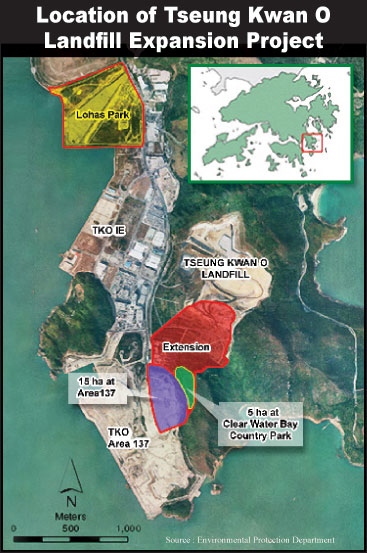
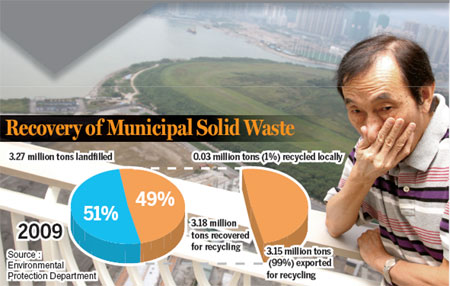
|
A poster at a lift entrance in Lohas Park calls on residents to protest against the expansion of Tseung Kwan O landfill site. Guo Jiaxue / China Daily |
|
Residents of Lohas Park have a view of the garbage trucks running back and forth on Wan Po Road everyday. Edmond Tang / China Daily |
(HK Edition 10/22/2010 page4)
